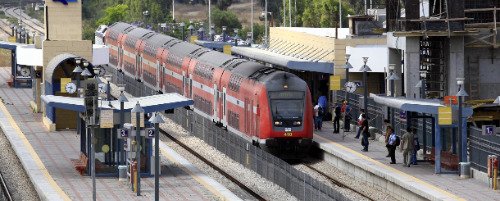Comptroller finds flaws in railway safety, fire and rescue

After years of delays that seriously damaged passenger services and resulted in unnecessary expenditure of hundreds of millions of shekels, the Israel Railways electrification project is finally on track and progressing according to a new timetable. However, the State Comptroller's report notes that its previous recommendations have only been partially applied and there are flaws in terms of safety, fire and rescue that have not been corrected and could endanger the lives of passengers in the event of an accident or breakdown.
The latest State Comptroller's report says that progress has been made since its previous reports in 2014 and 2018 on railway electrification. The project is now due to be completed in 2025 and although this is four years after the original date for completion, it is four years ahead of the date given to the State Comptroller just 12 months ago.
However, in terms of the recommendations in previous reports there is a mixed picture. While the electrification of additional lines is moving ahead there are problems in terms of rescue services. The communications infrastructure with the Magen David Adom ambulance service has not been connected up and special trains that can carry fire and rescue services if there is an accident in the long tunnels on the Jerusalem - Tel Aviv line have not been procured.
The railway electrification has probably been the biggest transport project failure in recent years. The years of delays have resulted in a range of complications. The engines and carriages ordered for electric lines for tens of billions of shekels cannot be used and instead Israel Railways had had to buy dual use diesel and electric rolling stock to ease the situation created.
These delays were exemplified in the Jerusalem - Tel Aviv fast rail link - the country's first electrified line, which after many postponements was due to open in April 2018 but was not fully opened until a year later. One of the major reasons for the delay was the flawed preparation of fire and rescue services for the 11 kilometer tunnel on the route. The State Comptroller report now details that the fire and rescue equipment has still not be fully deployed on required special trains in the event of the need for an emergency reswcue operation.
In response to the State Comptroller's report the Ministry of Transport said, "Despite the Comptroller's remarks about completing electrification of the railways, the Ministry of Transport has taken advantage of the past year and the halt in railway services during the Covid-19 period to implement complex infrastructure works supporting the project and shortening timetables by one to five years on various lines in the rail network. For example, electrification of the railway line between Ashkelon and Ra'anana has been brought forward by two years and electrification of the Nahariya - Tel Aviv line has been brought forward five years."
"Electrification of the railways is one of the main projects that the the Ministry of Transport has been promoting in recent years. The Ministry of Transport has given priority to implementing the railways electrification venture that has brought progress in work even at the expense of passenger services where the ministry provided alternative transport solutions. Local contractors were brought in to undertake civil engineering works supporting the electrification venture and building of the electric carriage depot in Ashkelon was speeded up."
"These measures and inserting incentive mechanisms into the contractor's agreement allowed continual work by the contractor and contributed to taking in work teams from abroad, which significantly increased work output and has dramatically brought forward the date of completion of works on the lines."
"It should be noted that the tender for implementing electrification works that was issued in 2015 and won by Spanish company Semi. Unfortunately the start of work was delayed by a lawsuit by the bidders who did not win and a compromise agreement was signed in January 2018. As already said, over the past year the Ministry of Transport and Israel Railways have invested major efforts in realizing the electrification project."
"The delays on the Jerusalem-Tel Aviv line were significantly reduced. The line to Tel Aviv-Savidor station was completed in March. The railway line linking the Sharon loop to Ashkelon is in advanced stages of construction and is expected to be completed at the same time as the carriages depot.
Related News
